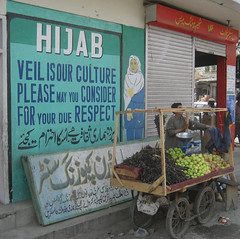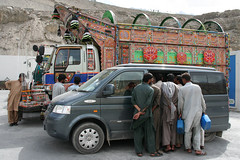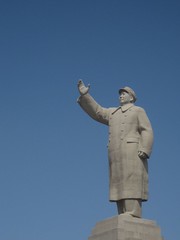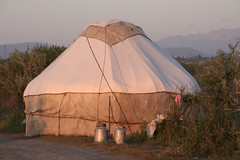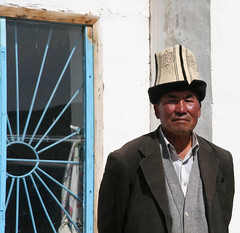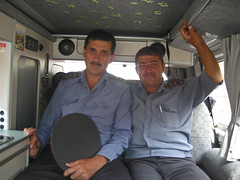If you are wondering why we haven’t posted a blog for a while, the simple reason is that we have been stranded twice in a week in the middle of nowhere (once on a remote Tajik / Afghan border and once in a back-end of beyond Kyrgyz village) due to horrendous quality diesel in Tajikistan, which combined with an environmental filter in our van (which refuses to clear itself as it should) appears to have damaged our engine. Our van no longer even starts; will need serious repairs; and we are an awful lot poorer. It has been pretty horrendous at times and a massive emotional rollercoaster.
On the plus side, despite all of the problems, we both loved Tajikistan: fantastic mountain scenery on the Pamir Highway; snow capped peaks; high altitude plains at around 4,000m; great views over Afghanistan; occasional herds of yak or sheep; the odd golden marmot sprinting across the road; and incredibly hospitable, friendly people.
If you are feeling very, very committed, read on for the saga of the past couple of weeks. We wrote all this as we went along (there was no reliable internet access in Tajikistan so we couldn’t post it). Sorry that this has resulted in a really ridiculously long blog, but being stranded, we had a lot of time on our hands, and it was cathartic to write it all down as it happened. Plus, we are testing our readers’ determination!!
Friday 20 July 2007From Bukhara, we took a long diversion to the southern tip of Uzbekistan so as to avoid a border crossing at which we had been told that the guards are even more corrupt than usual (and out here that means very, very corrupt). The drive was through some pretty impressive mountains, though, so we didn’t mind at all. It is good to be back in mountainous scenery again for the first time since Poland – endless stretches of flat Kazakh plain are all very well, but the view gets a bit monotonous after a while.
The border crossing all went incredibly smoothly; only three hours (which is amazing in this region) and without even so much as a van search on the Tajik side (that is really unusual, but the Tajik guards just couldn’t be bothered and were far more interested in reading their newspapers). We drove towards the capital, Dushanbe, via an old fort at Hissar. Whilst wandering around Hissar, a young Tajik shepherdess took us under her wing and gave us a guided tour of the local sights, namely the fortress, the “holy” spring and the herds of cows and goats. She was deaf, so the language barrier for once made no difference and she understood the international language of hand gestures and pictionary better than most.
We had to stay in a hotel in Dushanbe in order to comply with local bureaucracy regarding registration. Amusingly, we were stopped in the street and interviewed by Tajik television about our views on the place about two minutes after we arrived, so we just smiled and said polite things. Dushanbe is an odd place: there was a civil war raging here until about five years ago, and you can tell, not least because the police presence in really high (they even watch you eat your dinner at the outdoor cafes). The “Delhi Darhbar” (part of an Afghan restaurant chain based in Kabul, which masquerades as an Indian) provided our last decent restaurant meal for what we suspect will be a while.
The road out of Dushanbe up into the mountains was pretty spectacular, with great views down the valleys; huge gorges; and enormous rock-face walls by the side of the road. We passed some cycle tourists along the way, slogging up the hills in the heat. We also helped some locals to fix their van – their fuel tank had dropped right out of the bottom of the vehicle on one of the mountain passes. Their solution? Jack up the van using our jack and then cut out the driver’s seatbelt and use it to strap the fuel tank back on. Safety first…..
Tonight we are staying in the courtyard of someone’s house close to the roadside. As usual, we were mobbed by children as soon as we arrived and have found the people very hospitable – they insisted on bringing food and hot tea out to us in the dark, despite us protesting that there was no need. Very friendly, these Tajiks.
Sunday 22 July 2007Central Asia throws a lot at you. So much happens every day that even last week seems like an age ago. We left the courtyard where we had slept and immediately got stuck in a ditch. Queue lots of Tajiks turning up to help us jack up the van and put large stones in the ditch to flatten it out so that we could escape. We set off on a terrible road (though Kazakhstan makes these roads seem easy – everything is relative) towards the town of Khorog, which is at the start of the Pamir Highway. We got lost at one point, given the complete lack of signs, when we took what looked like the only available road (the only other route being blocked by a large rock fall). It turns out that we should have gone the other way and over the rock fall (no road clearing here, just grin and bear it). Some friendly local policemen jumped into the back of our van and showed us the way through, seemingly very excited to be in a VW van and with English people (they even took an English novel home with them, which they blatantly can’t read as they didn’t know a word of English, but they were just excited by how it looked).
We climbed up through some more spectacular scenery and dropped down to the Afghan border. For the rest of the day we followed the Panj River, which forms the border between Afghanistan and Tajikistan. It was quite odd to suddenly be so close to Afghanistan and we were surprised at the huge differences between the two sides of what is only a 100m stretch of water – there is no road on the Afghan side; the only means of transport is a donkey along a narrow path clinging to the cliff face; and whilst the women on the Tajik side wear long dressed and headscarves, on the Afghan side all the women we saw were wearing full face and body covering Burkhas. It is exciting to be so close to a country which we only ever hear about on the news, though.
We continued up into the mountains, past several tanks which were left at the side of the road after the civil war and several signs warning of landmines in the countryside. News started to filter through at the police checkpoints of a landslide up ahead which had closed the road. We were told that it could delay us for a few days, so having given a solider a lift home (we are starting to feel like the local taxi service), we parked up at a café with the usual interested locals and prepared to sit it out. Thankfully, the next day brought better news and we were told that vehicles were starting to get through. Three Polish guys turned up on motorbikes, on their way from Poland to Madagan in north-eastern Russia (as per Ewan McGregor and Charlie Boorman’s trip in the Long Way Round). They set off to try the road and didn’t come back, so on the assumption that they hadn’t fallen into the river, we concluded that it would be worth a go and set off. On arrival at the landslide, it emerged that the whole road had been washed away, literally wrenched into the raging waters below by an avalanche / landslide. The locals are not to be put off, though, and they had forged a “route” of a sort over the lower reaches of the mountain side. It was a really steep climb up and down over rocky surfaces, though, so the queue of traffic was long and the inevitable group of spectators very large. After a couple of hours it was our turn and Michael nervously tackled the slopes, but the lorries had bedded the rock down enough by then, so actually in the end it wasn’t too bad and the van coped admirably.
We stopped for the night at what we thought was a quiet village, but as is always the case in Central Asia it turned out to be anything but quiet. Despite having eaten in the van, we were invited into the family home for meat and potato soup, bread, watermelon and copious amounts of tea. Then one of the local girls turned up, news having spread of the British visitors, and announced that she spoke some English. Cue an invitation to her family home. They make it incredibly hard to refuse. In fact, they just pester you until you say yes. So we ended up in her house with all her family and even more food (this time lamb which they proudly announced they had killed just that day), tea and vodka. The house was amazing: a traditional Pamir house with only one large room, containing platforms all the way around the walls for eating and sleeping; no chairs or tables but instead lots of brightly coloured floor cushions and carpets (even the walls were covered in carpets used as wall hangings); and no windows, just a skylight set into the huge, carved wooden ceiling. The girls’ parents even did a traditional Badakhshani dance after dinner to entertain the crowds. Never a dull moment around here.
Monday 23 July 2007
After the last few days’ events, we planned a short, quiet day today. It was not to be. We are now in serious, serious difficulties. Even as I type that, “difficulties” somehow doesn’t sum up our current situation. The words “creek” and “no paddle” spring to mind.
We set off this morning in some beautiful scenery. I phoned my mum from Khorog and cheerfully assured her that everything was going really well. We filled up with diesel and set off into the mountains. As we got higher, an amazing view appeared of the snow capped, 5500m peaks at the edge of the Hindu Kush. And then, very suddenly, everything changed.
A light came on in our dashboard indicating that we had a diesel filter problem. The remedy, said our manual, was to drive at 60 km/h for 15 minutes continuously. No chance of that on these rickety mountain roads. We did our best, but couldn’t manage it. Suddenly, 20 minutes later, another light came on in the dash. Closely followed by another. It was apparent that we had serious engine problems. In the middle of nowhere.
We managed to pick up an Afghan mobile phone network from across the river for the first time in days (I never thought that I would get a network message saying “Welcome to Afghanistan”!) and called VW in the UK, who informed us that the only solution is to somehow get to a VW dealership and have a new diesel filter fitted, at a cost of £1,100. This made our stomachs churn, particularly as the nearest VW garage is 1,500km away in another country, accessible only via several 5,000m passes. And we are on a road with hardly any passing traffic (and certainly no mechanics, AA Roadside Assistance or tow trucks). This would happen here – we have a list of VW dealers and have been closer than this to a dealer for all but three days of the rest of this trip. As soon as we are out of range, our (until now 100% reliable) van decides to pack it in.
More phone calls to VW later and we were tanking it up and down the only reasonably flat 2km stretch of road for miles around, backwards and forwards, trying to achieve 60km/h for 15 minutes and burn the soot out of the diesel filter as VW advised. Two of the lights went out and we started to think that we were getting somewhere. But the third wouldn’t go out, despite us driving at the recommended revs for more the recommended length of time. And then the other two lights came back on. We sank into depression. There is just nothing you can do in the middle of nowhere: 1,500km, several high mountain passes and an international border (for which even tow trucks need visas) to the nearest VW garage. Not to mention the language barrier – we couldn’t just phone someone and organise a pick-up truck, even if there was a pick up truck to be had (which there isn’t).
This is by far the biggest low of our trip and although we are in a beautiful area, we just can’t really appreciate it as it is genuinely scary being stranded out here, not knowing how we will get ourselves and the van out of the country before our visas expire. And not knowing whether this spells the end of our trip.
Thursday 26 July 2007Since our last blog entry, we have spent three days stranded two and half hours away from the nearest town, parked in the garden of a man who has absolutely no clue what on earth we are doing. He doesn’t seem to mind, though, and his son keeps bringing fresh fruit out to try to cheer us up.
We feel like we are stuck in an episode of “Lost”, but one in which no-one on the island speaks English. And we are closer to Afghanistan than a tropical island. We have been utilising our survival skills – walking a mile down the road to a spring to filter water to drink and rigging up our outdoor campsite shower, hung from tree, as we have no other means of washing. The Afghan mobile network only picks up reception about 1km down the road, so we have walked that stretch of road (in the baking sun and raging wind) about fifteen times in the past three days, trying to organise for a truck to come and get us. The bottom line is that there is no truck. They just do not have recovery trucks here. If you break down, you get towed to a mechanic. If they can’t fix your car, you abandon it.
In episode two of this series of Lost, following our breakdown in episode one, we went to the nearest town by hitching a lift in an old Lada, with three of us squashed in the back. Two and a half hours later, we arrived and made some phone calls, including to Chris Brooks (who we had phoned on the basis that he has exactly the same van as us and, being a boy racer, understands more about cars than anyone else we know). Chris has been a star, liaising with VW in the UK and giving us a valuable third opinion when panic has taken hold. We spent most of the rest of the day driving around with the local mechanic trying to find a big enough truck for our van, to no avail. He did confirm, though, that diesel around here can be dodgy, and the conclusion that we have come to is that there isn’t really much wrong with the van other than dodgy diesel which has blocked a filter. Sadly, you can’t clean the filter without clean diesel and a decent stretch of road on which to burn off the soot, so we need to get to a VW garage. We returned to the van in another beaten up old Lada, which stopped approximately ten times on the way and eventually broke down. Our spirits were at this point pretty crushed and we vowed to avoid trekking around in Ladas any more.
In the third episode of this series of Lost, we spent the whole day trying to arrange a truck, with various different contacts in Tajikistan, all of whom we are told are important people locally and all of whom tried to be helpful, but none of whom could actually achieve any success. Chris continued to gather helpful information from VW. In the end, as we headed towards our third night stranded in a Tajik / Afghan valley, we decided that we will almost certainly run into issues with the expiry of our local registrations and we therefore decided to inform the British Embassy in Dushanbe of our predicament, so that we have them on side if we need them.
Being so close to Afghanistan, we are rather disappointed that the British Army hasn’t by now turned up from just across the border in a Chinook, piloted by some James Bond figure who can whisk us and our van up into the chopper, whilst playing “Land of Hope and Glory” on the radio and serving us tea and scones with clotted cream. We keep listening for the Chinook, but all we can hear is the crash of the glaciers above us echoing around the valley, which is rather more scary.
Sunday 29 July 2007On Thursday, we were rescued from Stranded Valley near Khorog, not by the SAS or RAF, but by a rescue party sent out by the British Embassy, comprising local energy worker Aziz, his English speaking ten year old daughter, and “The Master”, who it turns out is the local European car specialist. He took one look at our van and decided that we should try to drive to Khorog in convoy (we couldn’t go by ourselves as if we broke down there would be no passing vehicles and no phone reception to raise the alarm). We were glad to finally be doing something and the van coped admirably, arriving back in Khorog in one piece.
Aziz and his family were fantastic. We spent the next two days camped in their garden whilst taking various trips into Khorog for the Master to look at the van, assess the diesel particulate filter, an siphon off the bad diesel (which VW said couldn’t be done as we have an anti-siphon device, but the Master managed it by parking us on a slope and getting his little helpers to suck mouthfuls of diesel through a tube). We then filled up with new diesel procured by Aziz from the power station, which we are told is better quality (though we are really not sure how good it will be). In the evenings, I sat with the women and children, whereas Michael sat in the outhouse with the men, watching Russian-dubbed Chechen war films and downing shots of Tajik vodka.
Once the Master had done some work, one of the three warning lights on our van had disappeared. After much consultation, including internet research and phoning the UK, we decided to set off to see if we could make it to the VW garage in Bishkek, Kyrgyzstan.
We set off and the van seemed fine. We drove through amazing scenery on the climb up to the Pamir plateau. The views were stunning: snow capped mountains; high altitude plains at around 4,000m; occasional herds of yak or sheep; and the odd golden marmot sprinting across the road. We were so pleased to be on the move again and in such an amazing location. We pulled over to spend the night in the village of Alichur, a strange, half-Tajik, half-Kyrgyz outpost where a local who spoke excellent English told us that there are no jobs; no crops (nothing grows at such altitude); and in the winter temperatures drop to minus 50 degrees, such that people sleep with their animals just to keep warm. What a life.
From Alichur, the van buzzed along pretty happily to the Soviet town of Murghab and probably the world’s most remote whitewashed statue of Lenin. The scenery continued to be stunning: mountains surrounded by broad deserts and almost no traffic, other than a few keen European cycle tourists. We made it safely over the pass at 4,670m for some amazing views back down the valley.
Sadly, the van has just this evening started to feel a little sluggish going up hills and anything over 2,000 revs is an issue. We hope that this might be the effect of altitude on the firing of the engine, but we don’t really believe it because the effect seems to fluctuate irrespective of what height we are at. We have a horrible feeling that this all relates back to the rubbish diesel in Khorog and we are worried that Bishkek is still many days’ driving away.
Tonight we are parked outside a Kyrgyz homestay on the shores of the beautiful Lake Karakul, Central Asia’s highest lake at 3,915m. We have treated to a tasty feast including gorgeous fresh liver. We spent the evening chatting happily to some Dutch and Austrian cycle tourists. Tomorrow, Kyrgyzstan….
Monday 30 July 2007
We set off feeling really positive, but the van still had some sluggish signs. The road quality deteriorated, which didn’t help, as we climbed up to the pass on the Tajik / Kyrgyz border. We passed three groups of cycle tourists, but only one vehicle went past all morning. At the Tajik border post, we interrupted the Tajik border official from his shower so that he could grudgingly stamp us out of the country. The soldiers, who were living in converted oil tankers, swung open the gates and we entered our fourth “Stan” of the trip.
Immediately, the road deteriorated further, with muddy ruts, huge postholes and rough tracks over landslides. After 10k or so, the road was literally washed away and we had to follow a detour across the river bed. After this, we tried to restart the van, but nothing. No revs, no power, no movement and an ominous hissing noise from behind the engine. No mobile reception, no villages, no houses, no people, no passing cars. Oh sh*t.
We panicked (both), cried (me), despaired (both) and panicked some more. We were 28km from the nearest village and 800km from Bishkek (at least three days’ drive over the mountains). A Kyrgyz army bloke turned up and instead of helping, just took our passports, inspected our van and then refused to give our passports back. I was not in the mood, had a row with him in international sign language and pulled my best “don’t mess with me” face until he eventually returned our passports.
At that moment, the only Western vehicle we have seen for days started to cross the diversion through the river bed. Michael started frantically trying to attach the tow hook to the van, whilst I equally frantically waved down the vehicle. It turned out that the driver was French: a director of a major French energy company working in Kyrgyzstan. He even spoke some English. I could hardly believe it. I pleaded for him to tow us to the next village, though I had no idea what we would do when we got there, as we had heard that there was no telephone. He was a star and agreed to tow us, so we then had a scary ride on the end of a tow rope, which is no fun over these roads and with little braking capacity. We passed through Kyrgyz customs, where they refused to stamp our passports to say that we had entered the country or to give us a customs declaration (both of which will cause problems later on, no doubt), and instead demanded some European coins before they would let us through. What joy.
Whilst Michael dealt with that little lot, I spoke to the Frenchman, who it turned out was living for a while in Bishkek and amazingly himself used the VW-affiliated garage where we want to go. He got straight onto his satellite phone and had his assistant in Bishkek call the garage to request that a truck be sent out to get us. What a huge difference between the European approach and the Central Asian approach: it took him about three minutes to set the ball rolling, whereas in Khorog it took six days.
After much stressful towing, we arrived in the mountain village of Sary Tash. The Frenchman dropped us off (there was absolutely no way he could tow us any further, over the next mountain pass) and promised that a truck would be sent out from Bishkek to collect us. We have little choice but to put our faith in him. For the moment, he seems enormously reliable and pretty much the best person we could have met to bail us out: English speaking and has not only a decent Landcruiser with tow hook, but also contacts in Bishkek and a sat phone. It’s about time we got a break in this sorry saga.
Pali, if you are reading this (I suspect that you are not, given the length of this ridiculous posting), Michael says that he very much hopes that you are right in what you say: “all turmoil makes you stronger”….. because sometimes it really doesn’t feel like that.
So now we sit, wait, entertain / be entertained by the local children as usual, and keep hoping that a lorry will turn up which is capable of taking our van to Bishkek. Where they may or may not know how to repair the problem(s); where they may or may not have the right spare parts; where we may or may not have enough money to pay for what will no doubt be horrendously expensive repairs (plus the cost of a long distance truck ride); and where we may or may not find out that this is the end of our trip. But for the moment we are trying to forget about it and focus on cooking chicken curry instead. A few beers are in order, I think.
Monday 30 July 2007
We woke up to find that our water tank had been stolen (we plan to get it fixed if we ever get to Bishkek, but for the moment it lives outside the van as there is no room in the van whilst we sleep). Quite why anyone would steal a damaged plastic box and a severed metal bracket, which are of no use to man nor beast, is beyond us. But that’s what you get in back end of beyond towns like Sary Tash.
We instigated an interrogation of the local children who had been kicking around last night. They all gave different stories: some said that older boys had picked up our things and run off towards China; some said that a truck appeared, stopped, took our things and drove off towards Tajikistan; some denied all knowledge; and some got confused between various stories. We got angry and conducted house to house searches. We threatened to call the police, which we had no intention of doing, but it had the desired effect. A man from a community tourism programme turned up who spoke some English (no-one in the village knows much more than “hello”) and told the village that they were a disgrace to the Kyrgyz people, who are supposed to be very hospitable but so far have only stolen our things. Suddenly, a woman and girl turned up with our water tank and bracket under their arms, saying that they had found them at another house, but refusing to say where. Complete cowboys.
Today a recovery truck turned up from Bishkek. Despite us having given the model and dimensions of our vehicle repeatedly, the truck was way too small to carry us over the pass and on to Bishkek. After much shouting down a crackly telephone line to Bishkek (the telephone office here seems to date from c.1940) we managed to arrange that a bigger truck be sent out, to arrive tomorrow. Will it be big enough? We have no idea. And little faith. But we shall see.
For now, yet more sitting, waiting and wondering whether we will ever resolve this fiasco. Michael is starting to feel that this might be the end of our trip and that we should go home. I hope that he will feel more positive in Bishkek, but at the moment I have no idea how we are going to get there, whether our van can be fixed and whether we can afford it all. Oh, and our water tap has packed in. I’m not sure how much more of this emotional rollercoaster we can take. The past two weeks seems to have been going on for ever.
Thursday 2 August 2007I (Michael) am writing this whilst sitting at the wheel of our unfortunately non-functional campervan. We are 150km or so from Bishkek, careering down a 3000m pass strapped precariously to the back of a bright yellow Mercedes Benz recovery truck. This truck is being piloted alternately by one of two exhausted non-sleeping, non-eating Russian drivers who have been on the go without a break for almost 48 hours.
We have been perched atop the truck for about 23 hours or so and have been enjoying the scenery, at least during those moments when we don’t have to draw the curtains to hide from the police as, rather sensibly, travelling in this manner is deemed illegal. The landscape is less dramatic here than in Tajikistan but equally interesting with long, deep river gorges sporting green grassy slopes that are reminiscent of Snowdonia. These fertile pastures are inhabited every few hundred metres or so by the Kyrgyz yurts (their temporary summer tented accommodation), whilst the goats, yak, sheep and cattle enjoy the summer meadows. It is very surreal being sat up high and whisked through this environment just like a film set flying by on either side – the occasional bemused local waving at the strange contraption passing through.
Our current two drivers appear to actually be from EVI Autocentre in Bishkek (unlike yesterday’s cowboy - we weren’t quite sure where he came from), so our plan is to drop the van off there late this afternoon. We’ll then retire to a nearby hotel to try and get some sleep, decent food and much needed showers before making any tough decisions tomorrow about the fate of the van and the trip.
Friday 3 August 2007EVI Autocentre called this morning. There are no appropriate spare parts available in Bishkek. Their suggested alternative was to go to Almaty in Kazakhstan, but we have no visas for that and, as it turns out, there are no spare parts there either. Oh good. We feel very, very sick indeed. Not sure what to do next, but the team at EVI Autocentre are thinking about it further, so we shall see what happens.
